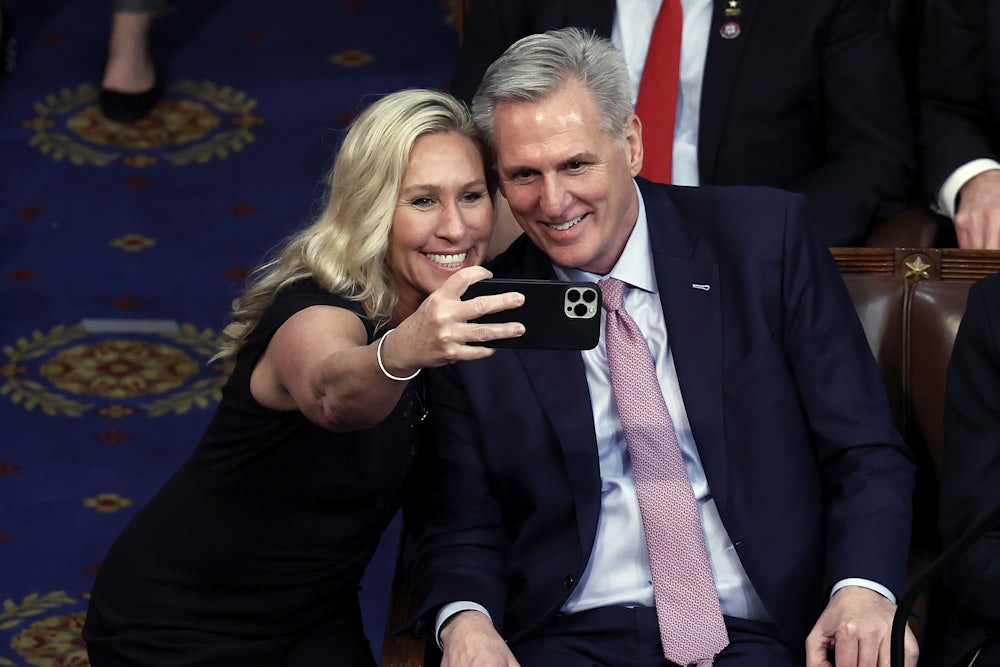Almost two years ago to the day, Congresswoman Marjorie Taylor Greene found herself committee-less, a punishment for past antisemitic and racist comments the then–first term congresswoman aired. Greene was stripped of her position on the House education and budget committees, a move that, perhaps to Greene’s joy, meant she wouldn’t be doing any serious legislative work of any kind. It also meant that come election time she couldn’t claim any major legislative accomplishments as singly hers, even if that was never really her style to begin with.
Fast forward to now, and Greene finds herself with seats on two of the House’s most powerful committees: the Committee on Oversight and Accountability and the Committee on Homeland Security.
The appointments are a dramatic elevation for the Georgia congresswoman. She sits on a committee that Republicans plan to use as the partisan tip of the sword for investigations into President Biden (Oversight), and a committee whose portfolio includes border security and general safety of the country at large (Homeland Security). Which has a lot of people wondering: Will MTG’s presence endanger national security and, to a lesser degree of importance, these committees’ reputations?
If there’s any topic that Greene has used to peddle misinformation and foster fear, it’s national security. The second-term congresswoman is the standard-bearer of the wing of the Republican Party that goes deep on misinformation, conspiracy theories, and thinly veiled racist tropes. In the last Congress, Greene’s lack of committees limited the platform she had to push those views. That’s not the case in this Congress, and it’s got national security experts—and particularly alumnae of the larger Homeland Security Committee community—worried.
“I think she will focus on the border ‘crisis’ and Biden’s ‘open borders’ policy,” a former top Department of Homeland Security official told me. “She might throw in some white replacement conspiracy rhetoric. She’ll try to impeach [DHS Secretary Alejandro] Mayorkas too. In short, MTG will not be a productive member. Hope I’m wrong, but I don’t think so.”
Even before Republicans retook control of the House, there was a widespread hunger among the caucus to forcibly remove or conduct extensive investigations of the DHS secretary. In truth, that’s mostly a symbolic gesture. Republicans would need two-thirds of the Democratic-controlled Senate to oust Mayorkas from the Cabinet. But the prospect of effectively firing Biden’s top Cabinet official in charge of public safety is especially enticing to border-obsessed conservatives who like to turn immigrants into the most dangerous bogeymen imaginable.
The fears of national security alums go beyond what Greene will try to do—because, again, she’s just one vote, and a junior member at that. It’s also a question of what access her new committee assignments get her.
“First and most immediately, my concern would be literally what the committee is giving her access to,” said Miles Taylor, the former chief of staff to Trump administration DHS Secretary Chad Wolf. “Just like the House intel committee, there’s a secure space beneath the Capitol where members could go get briefed by staff on really sensitive things. At this very moment, if she wanted to go down there and demand the committee give her a briefing on any number of classified issues, as a committee member, she has the right to do that, unless the chair of the committee denies it to her. So I think the things that Marjorie Taylor Greene now suddenly has access to, it’s alarming.”
Greene wouldn’t even have to share the classified information she is now allowed to see. She could simply continue to push her debunked, racist, outlandish, bizarre, dangerous claims and argue that she now has access to secret information to back it all up.
Greene’s ties to extremist groups are a factor here too. “The House Homeland Security Committee is the most important committee on Capitol Hill when it comes to terrorism, whether it’s foreign terror plots or domestic terrorist plots,” Taylor said. “And a lot of those groups are right-wing groups. If the committees continue the cadence that I instituted as national security adviser of the committee, they’re getting regular briefings on that subject, and on live-fire, real, investigative cases. So either one of two things is going to happen: She’s either going to get briefed on those cases and know information, potentially, about political allies of hers in the MAGA movement. And will she tell them? Or will she hold onto that information? Another possibility is these agencies, DHS and FBI, are going to be really wary about briefing those things in her presence. And I think they have a prerogative to do that.”
It’s not so long ago that the Committee on Homeland Security was viewed as an oasis for bipartisanship in an increasingly heated political atmosphere on Capitol Hill. Multiple lawmakers and former congressional national security types I talked to for this story argued that even in some of the most divided moments in the federal government, the seriousness of the Homeland Security Committee was an exception.
“If you accept the fundamental precept that the Homeland Security is one of the most bipartisan committees in all of Congress because everyone wants to keep the country safe, you’re starting from a position of strength as far as getting things done,” said former Congressman John Katko, who served as the ranking member of the committee until earlier this year when he left Congress. “And then when you look at some of the members on the committee on both sides, I think they have to make a decision whether they want to carry on that tradition or engage in partisan politics. To engage in partisan politics on Homeland Security, you really do it to the detriment of the safety of the country, so I trust that all of them will keep that in mind as the committee work unfolds.”
If Oversight and Homeland Security weren’t enough, Greene, essentially the marquee outspoken Covid skeptic, was appointed to an investigatory subcommittee focused on how the federal government handled the coronavirus pandemic. It sounds harmless enough. Except the panel is poised more to focus on coronavirus prevention policies and try to frame Anthony Fauci as some kind of nefarious ultragovernment technocrat obsessed with adding anti-freedom layers of bureaucracy to everyday life. That’s the kind of probe that Greene likes. After all, she compared masking mandates to the Holocaust and called on Fauci to be imprisoned.
So regardless of what Greene does on the committee, if she conducts herself as she has so far (warning that Biden’s open borders are a herald for the apocalypse, floating some kind of deep corruption at the FBI, arguing that there’s another side to what happened on January 6), she will likely damage the committee’s reputation as an unusually aboveboard panel. There’s very little evidence that Greene would move to put partisanship aside. She has always operated in a way that suggests she thinks that most of the moves lawmakers make are simply political sport without any serious policy implications. But this time those consequences could be very serious.






